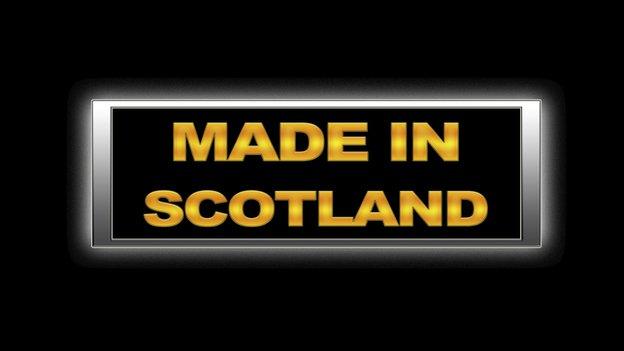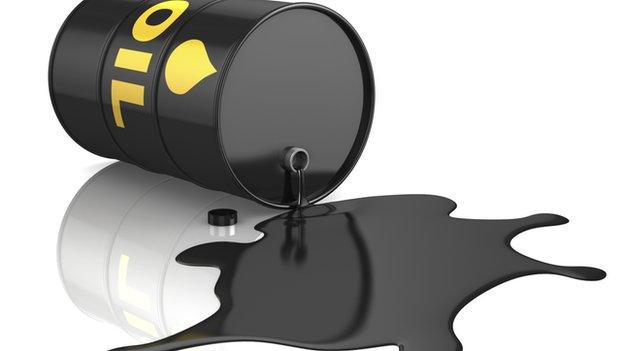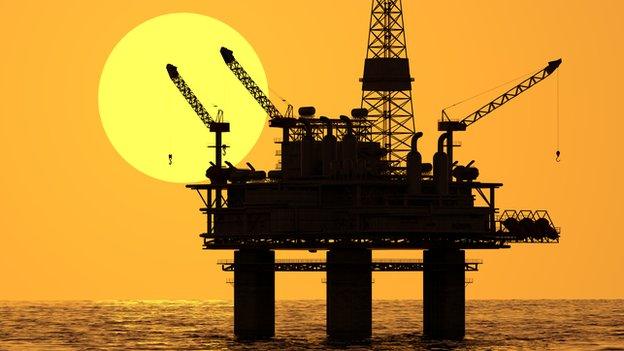Peril or paradise by the dashboard lights
- Published

The warning lights are flashing on the dashboard of the global economy. So goes the new message from the prime minister and chancellor.
But the latest evidence about the Scottish economy suggests they are being a bit alarmist.
That's unless you're looking at investment spending in the offshore oil and gas sector - of which, more later.
Drawing a positive message from the evidence may sound an odd role reversal, given that the Downing Street residents have been accusing the BBC of over-stating the scale of public spending cuts ahead.
Cynics - among whom, of course, I don't count myself - might think the Tory leadership is preparing for polling day in May and getting its excuses in early.
And one of the brighter flashing warning lights is the renewed crisis of the eurozone, which is a way for Messrs Cameron and Osborne to throw red meat to their party.
Robust growth
The latest State of the Nation Report from the Scottish government's chief economist, Dr Gary Gillespie, includes a few more of these flashing lights from far and wide - notably a slowdown in Chinese growth and moreso in Japan and markets which are still emerging.
But the main message closer to home is that 2014 has been a fairly robust year of growth - or at least the first half of it, the bit for which we've got figures. The economy has recovered lost ground, to reach its previous output peak.
According to the forecasters, next year looks like seeing a slowdown, just as it does for the UK as a whole, returning closer to trend growth rather than the catch-up we've been seeing more recently.
As with the EY Scottish Item Club report, published with the start of this week, Dr Gillespie is emphasising the strong employment figures, and how well business investment has been doing.
Strong investment ought to be A Good Thing. It's the bit of the economy Scotland and the UK need to grow if it's to get over its strange productivity blockage - using new, more efficient machinery, for instance. That way, higher real wages lie.
Business investment is also the best prospect for growing the economy when government spending is being squeezed, consumer spending is too often on the never-never, and exports are disappointing.
One downside, temporarily, is that it requires imports of investment goods (machinery), which weigh on the imbalance of trade.
Falling exports
Exports continue to be a drag on growth, which is why the eurozone stagnation and Chinese slowdown matter to us.
The November Purchasing Managers Index - which was also published on Monday, offering the most recent health check on the private sector - notes that we've just had the ninth month this year of falling export orders.
The PMI also showed business activity, while still in positive territory, has slowed. And one indicator flashing on the Scottish economic dashboard is in the backlog of work.

That's fallen, again, meaning there's more spare capacity. Anecdotal evidence suggests order books aren't being replenished as fast as they should be.
The better news on exports is that tourism has had a strong year, and when inbound foreigners spend money, that counts as export earnings.
Skill shortages
So there's reason for optimism, even if there's a softening of confidence across the recent business surveys.
What, then, are the warning lights on which to keep on eye?
One is political risk. Uncertainty about the future constitutional arrangements, and the consequent effect on tax and regulation, comes at a cost. We heard plenty about that in the independence debate earlier this year.
In Scotland, the constitutional question doesn't look like it's been resolved. And the Scottish ITEM Club adds that the prospect of a UK referendum on European Union membership adds more political risk. It points out that political stability was one of the best reasons for foreign direct investors coming to Britain. It may not stay that way.
Second is in skill shortages. The Scottish ITEM Club (ITEM is a modelling thing, by the way, and the club may have been so named to make it sound like economists have fun) isn't the first to issue a warning on that.
It says we may have to open the door to more migrant workers, or companies may have to do more to invest in skills. The wrong outcome would be if the shortage of necessary skills only pushes up wages.
Crude oil
The other warning is from the falling price of a barrel of Brent crude oil. As Robert Peston has argued, there's lots to welcome about lower energy costs.

That's particularly if you're in an energy-intensive industry, from smelting to transport, just as you should welcome it if you're filling up your car's tank (though it is clear that the price of a litre is falling a lot more slowly than a barrel of the black stuff).
A low price for oil (and other commodities) helps keep inflation down. In oil producers, however, it means they lose their spending power, some struggle to balance their government budgets, and Russia is heading into recession and ruble-trouble.
Likewise, cheaper fuel is not at all welcome everywhere in Britain. In and around Aberdeen, the economy goes with the boom and bust of the oil market. Recently, its investment boom has been an important part of getting Scotland through the downturn.
Shelved plans
Now, it looks like oil's turn for bust. Brent crude has fallen more than 40% since peaking at $115 in summer. It's begun the week with a 4% one-day fall to just above $66.
Looking at future supply and demand trends, analysts at Morgan Stanley bank forecast the price will average $70 next year, and could sink to $43 in the second quarter. Since they published that, North American fracking activity turned out to be higher than expected, pointing to an even bigger over-supply than predicted.
As I've noted before, the UK offshore industry was warning that it would cancel a third of investment plans if the price fell to $80.

That effect is under way. BP is accelerating plans to shed jobs, of which it has quite a lot in Aberdeen.
ConocoPhillips is cutting its investment budget for next year by a fifth, to $13.5bn - though that's mainly affecting North American projects.
Industry analysts expect Chevron to put its North Sea Rosebank field into cold storage, meaning £6bn of investment that won't be going ahead while the price is low.
Norwegian energy consultancy Rystad calculates the global industry could see $150bn of projects that won't go ahead next year, out of $500bn-worth of investment decisions.
Jobs challenge
According to an oil economist who wants to be the SNP's candidate in the Gordon constituency, one Alex Salmond, this is the stuff of political campaigning.
"The North East faces a jobs challenge," said the first minister as he announced the next move in his political career.
"We are a prosperous area but the likely impact of a period of low oil prices will be to cost us local jobs in the short term."
The former SNP leader is therefore calling for more diversification into other energy markets, support for traditional farming and fishing industries, and for investment in education, skills and transport.
That's a memo to his successor, right there. The Norwegian-style oil fund will have to wait a bit longer.
Home truths
One further points from these latest reports, as a reward to you for reading this far: yet another report, this time from the Bank of England, has triggered alarm bells about the middle class being walloped by higher borrowing costs when the base rate eventually rises from 0.5%.
One point: anyone taking a loan out in the past six years ought to have been clear about the consequences of that happening.
Another: the ITEM Club report points out that Scottish mortgage-holders should be better placed to absorb higher payments.
It cites lenders' data showing the price:earnings ratio for first-time buyers is significantly less daunting in Scotland.
And the cost of servicing the average home loan accounts for 21% of average earnings in Scotland. Due to low interest rates, that's a historically low level.
In the UK as a whole, it's 30%; in south-east England, it's 38%; and in London, it's already in the unaffordability danger zone, at 44% of earnings.